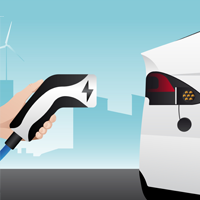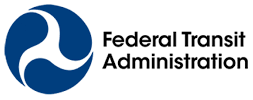PECO EV Programs & Incentives
PECO Pilot Discount for Fast Charging Infrastructure

PECO is offering a pilot discount on distribution charges for commercial customers installing fast charging infrastructure.
Current Phase
- Available until Dec. 31, 2025
- Installation of DC fast charger (Level 3) required
- Demand credit of up to 50% of charging capacity for 36 months (does not waive minimum demand of 40% of contract maximum demand)
- Customer data reporting requirements apply for any charger(s) not metered and billed separately from other loads at the premises
- Customers enrolled less than 36 months prior to the end of this phase may continue into the next phase if they meet the eligibility requirements
Next Phase
- Available January 1, 2026 through May 31, 2029
- Installation of DC fast charger (Level 3) required
- Charger(s) must be metered and billed separately from other loads at the premises
- Demand credit of up to 30% of measured demand for 36 months, and minimum demand is reduced to 30% (from 40%) of contract maximum demand
- The 36-month time limit is inclusive of participation in both phases
PECO Public Benefit Charging Program

Public Benefit Charging Program incentives are capped at 50% of the cost of equipment, installation, and make ready work for the project and consideration would be given to any applicable governmental grant or tax credits. Level 2 chargers and Direct Current Fast Chargers (DCFCs) are eligible for rebates.
Transit authorities installing DCFCs with a capacity of at least 250 kW per charging port are subject to a maximum incentive of $200,000 per project site.
All other eligible customers are subject to a maximum annual incentive of $60,000, inclusive of incentives paid through both the L2 Program and the Public Benefit Charging Program.
The following Customer Segments are eligible for the Public Benefit Charging Program:
- Public transportation Services
- 501(c)(3) organizations (non-profits)
- Local government
- Publicly accessible chargers located in a state-designated EJA
PECO Level 2 Commercial EV Program

The Level 2 Program will incentivize the adoption of Level 2 EV charging technology, with enhanced support for chargers located in an EJA.
The pilot features two rebate levels:
1. A $2,000 rebate per port for projects located within PECO Electric Service Territory
2. A $3,000 rebate per port for projects located within PECO Electric Service Territory AND in an EJA
The following Customer Segments are eligible for the Public Benefit Charging Program:
- Customers are required to apply prior to the start of charging station projects.
- Customers receiving rebates must provide data from the EV charger(s) for two years.
- The Pennsylvania Department of Environmental Protection (DEP) also offers EV charging rebates. For more details, visit bit.ly/drivingpa.
- Governmental incentives such as those offered by the Pennsylvania DEP through their Driving PA Forward and Alternative Fuel Incentive Grant programs can be combined with this rebate as long as all incentives do not exceed the total project costs.
- Program incentives are available to eligible commercial and industrial customers, including those who shop for electric generation supply.
- Funds are limited and subject to availability.
IRS: Commercial Clean Vehicle Credit

Businesses and tax-exempt organizations that buy a qualified commercial clean vehicle may qualify for a clean vehicle tax credit of up to $40,000 under Internal Revenue Code (IRC) 45W. The credit equals the lesser of:
• 15% of your basis in the vehicle (30% if the vehicle is not powered by gas or diesel)
• The incremental cost of the vehicle
Qualified vehicles with gross vehicle weight ratings (GVWRs) of under 14,000 pounds have a maximum credit of $7,500.
Plug-in electric vehicles must draw significant propulsion from an electric motor with a battery capacity of at least:
• 7 kilowatt hours if the gross vehicle weight rating (GVWR) is under 14,000 pounds
• 15 kilowatt hours if the GVWR is 14,000 pounds or more
• 15% of your basis in the vehicle (30% if the vehicle is not powered by gas or diesel)
• The incremental cost of the vehicle
Qualified vehicles with gross vehicle weight ratings (GVWRs) of under 14,000 pounds have a maximum credit of $7,500.
Plug-in electric vehicles must draw significant propulsion from an electric motor with a battery capacity of at least:
• 7 kilowatt hours if the gross vehicle weight rating (GVWR) is under 14,000 pounds
• 15 kilowatt hours if the GVWR is 14,000 pounds or more
- Businesses and tax-exempt organizations qualify for the credit
- Consult your tax adviser to make sure you qualify
- Restrictions apply, see IRS website for detils
IRS: Federal Tax Credit for EV Charging Equipment for Businesses

Businesses are eligible to receive a Federal Tax Credit for alternative fueling infrastructure including EV charging stations. Tax credits for qualified alternative fueling infrastructure are up to 30% of the cost to purchase and install the infrastructure. Fueling station owners who install qualified equipment at multiple sites are allowed to use the credit towards each location. Consult with your tax professional to see how these credits apply to your business.
- Consult a tax professional to see if your installation qualifies
- Visit IRS website for additional information
Driving PA Forward - Pennsylvania Department of Environmental Protection

The Driving PA Forward grant and rebate programs were developed to improve air quality statewide by driving transformation from older, high-polluting diesel engines to clean transportation technologies.
Eligible Project Categories
• Class 4-8 Local Freight Trucks and Port Drayage Trucks
• Class 4-8 School Buses, Shuttle Buses, or Transit Buses
• Airport Ground Support Equipment
• Forklifts and Port Cargo Handling Equipment
• Light Duty Zero Emission Vehicle Supply Equipment
• Diesel Emission Reduction Act (DERA) Option: PA State Clean Diesel Program
Eligible Project Categories
• Class 4-8 Local Freight Trucks and Port Drayage Trucks
• Class 4-8 School Buses, Shuttle Buses, or Transit Buses
• Airport Ground Support Equipment
• Forklifts and Port Cargo Handling Equipment
• Light Duty Zero Emission Vehicle Supply Equipment
• Diesel Emission Reduction Act (DERA) Option: PA State Clean Diesel Program
- Restrictions apply; see program website for details
- Program details change regularly, see program website for details
Pennsylvania Alternative Fuels Incentive Grant Program (AFIG)

The AFIG Program helps to create new markets for alternative fuels in Pennsylvania which enhances energy security. An investment is being made not only in alternative fuels, but the deployment of alternative fuel vehicles, fleets, and technologies. Alternative Fuel Incentive Grant projects promote and build markets for advanced, renewable and alternative energy transportation technologies. The intent is to provide a stimulus for opportunities that better manage Pennsylvania's fuel resources in a way that also improves the environment, supports economic development and enhances the quality of life.
Application deadlines: There are two application periods. The program will collect and review all applications submitted by 11:59 PM on June 28, 2024, and again by 11:59 PM on December 20, 2024.
Application deadlines: There are two application periods. The program will collect and review all applications submitted by 11:59 PM on June 28, 2024, and again by 11:59 PM on December 20, 2024.
- Funding cycles for this program are subject to change - be sure to visit the program website to determine if funds are currently available.
EPA: Clean Heavy-Duty Vehicles Grant Program

The Inflation Reduction Act invests $1 billion to replace existing non-zero-emission heavy-duty vehicles with zero-emission vehicles, support zero-emission vehicle infrastructure, and to train and develop workers. The EPA will offer funding to eligible recipients to replace existing non-zero-emission Class 6 and 7 heavy-duty vehicles with eligible Class 6 and 7 zero-emission vehicles.
- Restrictions apply, see program website for details.
- Time sensitive application process, application periods open and close.
EPA: Diesel Emissions Reduction Act (DERA)

The Diesel Emissions Reduction Act (DERA) Program funds grants and rebates that protect human health and improve air quality by reducing harmful emissions from diesel engines. The program solicits applications for projects that achieve significant reductions in diesel emissions and exposure, particularly from fleets operating in areas designated by the Administrator as poor air quality areas.
EPA: Clean School Bus Program
The EPA’s Clean School Bus Program provides $5 billion over the next five years (FY 2022-2026) to replace existing school buses with zero-emission and low-emission models. This program is supported with funding from the Bipartisan Infrastructure Law,- Restrictions apply, see program website for details.
- Time sensitive application process, application periods open and close.
Federal Airport Zero Emission Vehicle (ZEV) and Infrastructure Incentives

The Airport Zero Emissions Vehicle (ZEV) and Infrastructure Pilot Program improves airport air quality and facilitates use of zero emissions technologies at airports. Created in 2012, the program allows airport sponsors to use Airport Improvement Program (AIP) funds to purchase ZEVs and to construct or modify infrastructure needed to use ZEVs.
Grant funding must be used for airport-owned, on-road vehicles used exclusively for airport purposes. Vehicles and infrastructure must meet the Federal Aviation Administration's Airport Improvement Program requirements, including Buy American requirements.
Grant funding must be used for airport-owned, on-road vehicles used exclusively for airport purposes. Vehicles and infrastructure must meet the Federal Aviation Administration's Airport Improvement Program requirements, including Buy American requirements.
- Program details subject to change, see program website for details
- The annual deadline for pre-applications is November 1
Federal Transit Administration Grant Programs

FTA provides grants to local public transit systems, including buses, subways, light rail, commuter rail, trolleys and ferries. Since 1964, FTA has partnered with state and local governments to create and enhance public transportation systems, investing more than $13 billion annually to support and expand public transit services. FTA provides annual formula grants to transit agencies nationwide as well as discretionary funding in competitive processes.
The Bipartisan Infrastructure Law, as enacted in the Infrastructure Investment and Jobs Act, was signed into law by President Biden in November 2021 and is the largest federal investment in public transportation in the nation’s history. The legislation reauthorizes surface transportation programs for FY 2022-2026 and provides advance appropriations for certain programs. The Bipartisan Infrastructure Law authorizes up to $108 billion to support federal public transportation programs, including $91 billion in guaranteed funding.
The Bipartisan Infrastructure Law, as enacted in the Infrastructure Investment and Jobs Act, was signed into law by President Biden in November 2021 and is the largest federal investment in public transportation in the nation’s history. The legislation reauthorizes surface transportation programs for FY 2022-2026 and provides advance appropriations for certain programs. The Bipartisan Infrastructure Law authorizes up to $108 billion to support federal public transportation programs, including $91 billion in guaranteed funding.
- Programs change regularly, see FTA website for complete details

